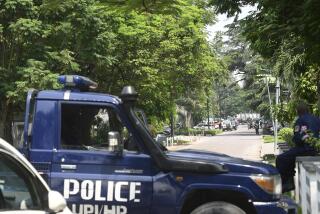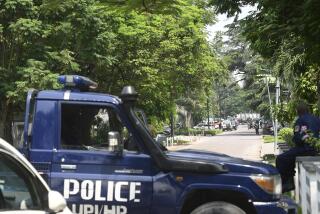Congo May Be Entering a Dangerous New Phase
- Share via
JOHANNESBURG, South Africa — The apparent assassination of Congolese President Laurent Kabila has created a dangerous power vacuum that could lead to an escalation of the troubled country’s civil conflict as the warring sides jostle for control, analysts and diplomats said Wednesday.
Any intensification of the fighting would plunge the vast Central African nation into another chaotic phase in its tumultuous history, they warned.
Kabila was shot Tuesday in a palace attack in the Congolese capital, Kinshasa, according to several foreign diplomats. Some observers said that he and his son Joseph were killed. But Congolese officials continued to deny that the senior Kabila is dead--insisting that he had merely been wounded--and said his son had been put in charge of the government temporarily.
Political observers said Kabila’s death could spur on the rebels who have been trying to oust the Congolese strongman for more than two years, suggesting that they may now launch a new offensive in an attempt to overthrow Kabila’s remaining allies.
“My prognosis is that it’s going to get a lot worse before it gets better,” said Winston Meso, a researcher at the Center for African Studies in Pretoria, South Africa. “Kabila was operating an autocratic regime, around the concept of ‘Big Manism.’ It was a one-man show. Now there is a void. The political center has collapsed.”
Kabila, 61, took power in May 1997 after a coup sponsored by Uganda and Rwanda to oust longtime dictator Mobutu Sese Seko.
Presidential spokesman Lambert Kaboye told Associated Press that Kabila had been evacuated to an undisclosed country after Tuesday’s attack. And Congo’s ambassador in Zimbabwe, Kikaya Bin Karubi, told Zimbabwean television that Kabila was being treated there.
According to some reports, a bodyguard reportedly shot him in the back and right leg, but one unconfirmed report said disgruntled generals had killed him.
Analysts confirmed that some of Kabila’s senior officers were tired of his meddling in military affairs and that, privately, there had been complaints that he was stealing money intended for weapons purchases.
Another theory is that supporters of the late Mobutu staged a coup with the help of certain rebel factions. The current conflict in Congo pits Kabila’s government--now backed by Angola, Zimbabwe and Namibia--against splinter rebel groups supported by his former allies Rwanda and Uganda.
Analysts said a new regime in Congo could help boost flagging peace talks by trying to restart serious negotiations with the rebels.
“Maybe the new incumbents might show a more modified approach to the peace process and try to build up their stature,” said Richard Cornwall, a senior analyst at the Institute for Security Studies in Pretoria.
Much would also depend on the reaction of the rebel groups to Kabila’s death.
Some foreign diplomats and negotiators considered the Congolese president a major stumbling block to the implementation of a 1999 peace deal, but the rebels have also been accused of violating the agreement in an effort to recapture lost ground and fortify military positions.
With their common foe apparently out of the picture, the rebels--already at odds among themselves--may decide to push their independent agendas and protect their interests.
“The removal of Kabila was the common ground of all the rebel groups,” said Hermann Hanekom, a former South African ambassador to Congo and now a current affairs consultant at the Africa Institute of South Africa. “Now their binding factor has been removed.”
But some observers were optimistic that the rebels will warm toward any prospective softening of a new Congolese leader’s negotiating position.
“This does open a bit of a window of opportunity,” said Cornwall, the senior analyst. “Kabila has been so obscurant in his dealings with people. [His death] may have broken the logjam.”
Crucial, too, will be the attitude of Zimbabwe and Angola--Kabila’s key military allies--and whether they will throw back the new regime. In the case of Zimbabwe, President Robert Mugabe was a friend of Kabila. With his business partner no longer on the scene, he may pull his troops back from an involvement that has long won him much criticism at home, experts say. It also remains to be seen whether a new government in Kinshasa would continue to give free rein to allies such as Zimbabwe to exploit the country’s mineral riches in return for their military support.
More to Read
Sign up for Essential California
The most important California stories and recommendations in your inbox every morning.
You may occasionally receive promotional content from the Los Angeles Times.














